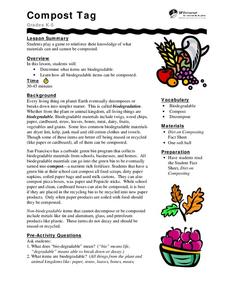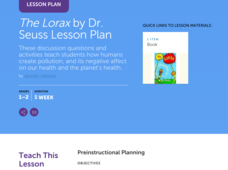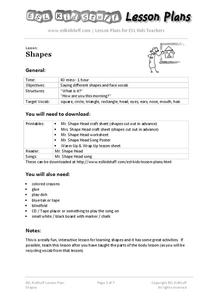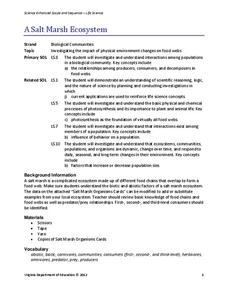SF Environment
Compost Tag
Composting is a great way to get children involved in recycling. First, they discuss how biodegradable products decompose to make compost. Then, they talk about what can and cannot be composted. They play a game similar to around the...
Curated OER
Solid Waste
Students determine the percentage increase in output of solid waste in the U.S. They determine the length of time it takes for throw away items to decompose.
Dick Blick Art Materials
“Gawu” — African-influenced Tapestry
Here's a great way to combine environmental science with art. Kids use recycled materials to create their own Gawu, a tapestry made of discards. Although designed for special education classrooms, the activity is sure to engage all...
Chicago Botanic Garden
Personal Choices and the Planet
The last activity in the series of four has individuals determine steps they can take to reduce their carbon footprints and then analyze their schools' recycling programs. Through a sustainability audit, they identify how and where their...
Chicago Botanic Garden
Calculating Your Ecological Footprint
You can lower your ecological footprint by recycling! Lesson four in this series of five has individuals, through the use of a computer, calculate their ecological footprints. Through discussions and analysis they determine how many...
Education Outside
Papermaking
Imagine recycling food scraps and using them to make paper. The directions are all here in a seven-page packet that details several paper-making strategies.
Chicago Botanic Garden
Personal Choices and the Planet
How big is your footprint? Activity three culminates the series by having groups complete carbon footprint audits with people in their schools and/or around the districts. Groups then gather their data, create a presentation including...
Scholastic
The Lorax by Dr. Seuss Lesson Plan
Celebrate the whimsical world of Dr. Seuss with a instructional activity that features the memorable tale of The Lorax. After listening to a riveting read-aloud, scholars take part in a grand conversation about the story and environment....
Missouri Department of Elementary
I’m A Star!
A lesson encourages scholars to be star community members. Pupils take part in a class discussion that challenges them to brainstorm at least two ways to show responsibility within one's community. Small groups play a game in which...
ESL Kid Stuff
Shapes
Work on shapes and body parts at the same time with a fun set of activities. Kids sing and read about Mr. Shape Head, who has shapes on his face, before making their own Mr. Shape Head.
University of Colorado
Terra Bagga
Earth's magnetic poles switch positions about every 200,000—300,000 years. In the activity, groups create a planet with a magnetic field. Once made, they use a magnetometer to determine the orientation of the planet's magnetic field....
Advocates for Human Rights
The Right to a Clean Environment in the United States
Even if a school has gone digital, chances are there's still plenty of paper being used. The three activities help scholars learn about the environmental impact of paper and another consumer products of their choosing, the issue of...
Curated OER
Litter Patrol
Students collect litter. In this recycling lesson, students review the term litter and give examples. Students collect litter at their school. They separate the litter into different categories and discuss if these materials could be...
Curated OER
RECYCLING: REDUCE, RECYCLE, REUSE
Students participate in group activities about the concepts of reducing, reusing and recycling. They read a poem, demonstrate recycling, reusing and reducing, and work in a small group to present a play.
Curated OER
Recycling
Students investigate how to reduce, recycle, and reuse items in order to conserve natural resources. They complete a trash graphing activity after discussing different types of trash. Finally, the examine ways to buy recycled products to...
Curated OER
Recycled Treasures
Young scholars develop creative-thinking skills that they will use repeatedly throughout their life. In this early childhood art lesson, students develop creative-thinking, social-development, and language skills, and an awareness of...
Curated OER
Valentine’s Day Unit: Writing & Literacy Center Activities
Students participate in Valentine's Day writing and literacy center activities. In this writing and literacy lesson, students develop Valentine's Day journals using recycled cards and small blank sheets of paper. They write sentences...
Wilderness Classroom
Pollution
Educate scholars on pollution—air, water, and land—with a series of lessons that begin with a thorough explanation of each type. Learners then take part in three activities to reinforce the importance of reducing pollution. They...
Curated OER
Terrabagga Activity Using a Magnetometer
Clever! Earth science learners construct a model of a planet containing a magnetic core. The planet, Terrabagga, is made out of a paper grocery bag, magnets, a dead D battery, and rubber bands. Pictures of each step of the construction...
Sea World
Saving the Wild: Conservation Around the World
Enhance your unit on conservation, ecosystems, or migration with a series of lessons about ways to save the wild around the world. Kids research types of conservation, such as recycling, and use their geography skills to map the...
Virginia Department of Education
A Salt Marsh Ecosystem
What a web we weave. Pupils use yarn as the primary resource to create a web depicting the intricacies of a salt marsh ecosystem. They participate in a question and answer session, which leads to an in-depth facilitated discussion about...
Virginia Department of Education
Owl Family Natural Selection
How do genetic mutations within a population lead to future variations? Provide your class with the resources to answer this question and more upon completing an activity on natural selection. The entire class participates in a fun role...
WE Charity
High School–Module 2: Circular Economy and Nature
Everyone's heard the popular slogan reduce, reuse, recycle, but there may be a better way to talk about sustainability. Using the second activity from the five-part WE Are Innovators—High School Modules series, learners explore issues...
Curated OER
It All Adds Up
Students brainstorm reasons for politicians to expand recycling programs and find statistics to support recycling programs. They design posters, displaying a compelling statistic about recycling, to convince students at their school to...

























